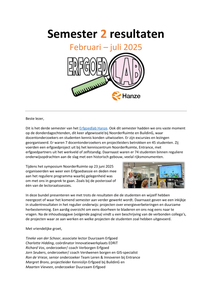Bij het Erfgoedlab Hanze ontmoeten de erfgoedpraktijk, onderwijs en studenten elkaar. Er worden opdrachten beschikbaar gesteld (cases en kennisvragen) en er worden excursies en lezingen georganiseerd. In deze bundel staan de projecten, activiteiten, opbrengsten en publicaties beschreven.
DOCUMENT

Bij het Erfgoedlab Hanze ontmoeten de erfgoedpraktijk, onderwijs en studenten elkaar. Er worden opdrachten beschikbaar gesteld (cases en kennisvragen) en er worden excursies en lezingen georganiseerd. In deze bundel staan de projecten, activiteiten, opbrengsten en publicaties beschreven.
DOCUMENT

Bij het Erfgoedlab Hanze ontmoeten de erfgoedpraktijk, onderwijs en studenten elkaar. Er worden opdrachten beschikbaar gesteld (cases en kennisvragen) en er worden excursies en lezingen georganiseerd. In deze bundel staan de projecten, activiteiten, opbrengsten en publicaties beschreven.
DOCUMENT

In de periode september 2019 tot april 2020 heeft HanzePro SOFE in opdracht van de provincie Groningen een verkenning uitgevoerd naar de restauratiebranche in de provincie Groningen. De thema’s onderwijs, arbeidsmarkt en innovaties stonden daarbij centraal. Het doel van de verkenning was om te komen tot een gedragen beeld van de huidige situatie en wat vervolgens nodig is om de restauratiebranche in de provincie Groningen toekomstbestendig te maken. Op 13 juli 2020 is het rapport van de verkenning door HanzePro opgeleverd.Het doel van dit verdiepend onderzoek is om in beeld te brengen wat voor de onderdelen Erfgoedlab en Kennisdatabase nodig is om deze initiatieven succesvol te realiseren.
DOCUMENT
